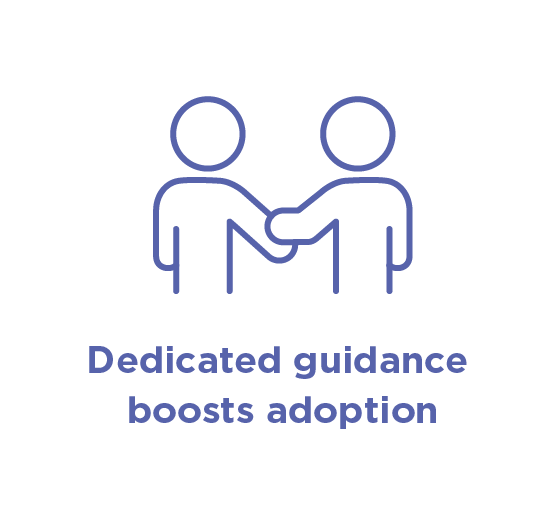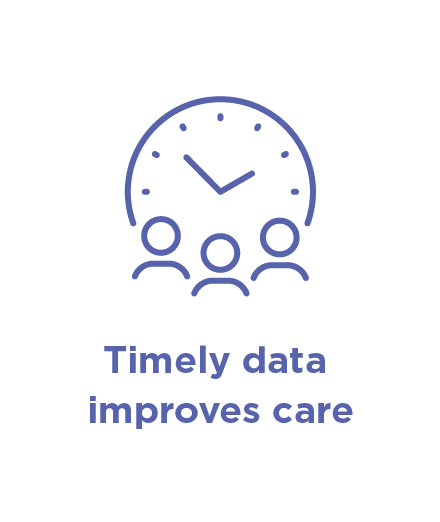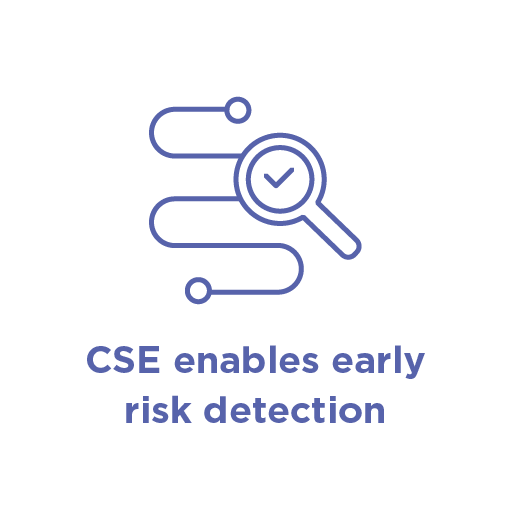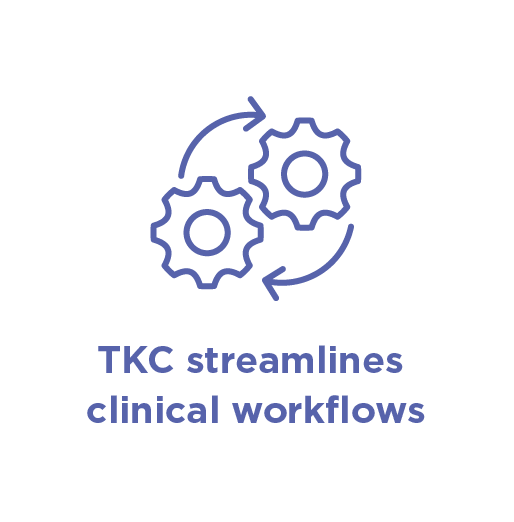Top End Aboriginal Health Research Alliance is an NHMRC-accredited Research Translation Centre. We collaborate to deliver research-informed healthcare and training. The below case studies highlight our work in translating research into better health outcomes and building capability across the system.
Case studies on this page:
- Developing, re-designing or adopting platforms, systems or workforce initiatives: Territory Kidney Care Implementation Officers
- Providing better care: The Communicate Study Partnership
- Meeting the needs of your end-users in your population: Closing the Gap: antenatal and early childhood sustained home visiting

Case studies from all Research Translation Centres are available from Impact and outcomes.
Developing, re-designing or adopting platforms, systems or workforce initiatives: Territory Kidney Care Implementation Officers
Challenge
In the Northern Territory (NT), where the population is highly mobile and often access multiple primary and hospital-based services, there are significant challenges to the provision of optimal integrated care. Due to unconnected and siloed healthcare systems, patients frequently have multiple electronic and paper health records across government and non-government services. This increases the complexity and disjointed nature of care, making it difficult for treating clinicians to obtain a complete and accurate picture of a patient's health journey.1
Approach
Territory Kidney Care (TKC) is an integrated clinical decision support system that links primary health data from government and non-government services with hospital data for people with chronic disease that put them at risk of developing kidney disease. TKC has been developed in partnership with the Northern Territory Department of Health and the Aboriginal Community-Controlled Health Services (ACCHS) sector. TKC undertook an iterative and incremental design process in collaboration with stakeholder health services and clinicians to ensure the system was built 'fit for purpose'.
The Implementation Officer (IO) project facilitates a process for two-way communication between the Menzies TKC project team and four participating health services through the recruitment of an IO for each site. The project was established in 2022. As part of their existing roles within each of the health services, the IOs assisted in the uptake of TKC within their organisations by providing onsite training to clinicians and feedback to the TKC project team regarding the barriers and enablers to accessing TKC.
Significance
Interviews with clinicians in participating health services indicate that the placement of TKC IOs within partnering health services was perceived as a key enabler to using the platform, providing organisations with a dedicated, onsite TKC champion to offer advice and assistance.
Qualitative and survey data indicate that TKC has facilitated timely access to comprehensive information for patients, helping to improve patient outcomes. These findings have been submitted for publication.
Additionally, a consultation process with the Big Rivers region in the NT, where 2 Implementation Officers (IO) were located, identified how TKC could be used to improve clinical workflows and create efficiencies in processes. Documentation and a video outlining the new workflow processes using TKC to triage patients for the type and location (telehealth, remote or urban) of clinic appointments was developed. This process to establish more efficient integrated Models of Care is intended to be replicated in other regions of the NT.
During this work, other key functionality in TKC, specifically the Clinically Significant Events (CSE) interface, which is an important mechanism for risk stratification and early identification of clinical issues, was reviewed with the IO, GPs and tertiary clinicians. Changes to workflows were identified to create efficiencies, which also necessitated interface changes to TKC to improve the user experience. This process will create regular opportunities for primary and tertiary clinicians to review at risk patients and establish efficient communication methods for patient management.




Value-add of centre
High staff turnover, including for the IO roles, has challenged project implementation. The partnership between participating health services has enabled the integration of the IO officer role across multiple services. In 2025, a regional TKC IO position will coordinate and undertake project activities in all 3 health services in the Katherine region.
Reach
Within the Top End Aboriginal Health Research Alliance’s (TEAHRA) geographic footprint (Top End of the Northern Territory), IOs are employed in the North East Arnhem Land, Katherine township, and Big Rivers regions.
Next steps
A new nursing position associated with the project will be employed in 2025 to work with Northern Territory Government primary healthcare services, extending the project footprint to all regions of the NT.
References
1 Gorham G, Abeyaratne A, Heard S, et al. Developing an integrated clinical decision support system for the early identification and management of kidney disease—building cross-sectoral partnerships. BMC Med Inform Decis Mak. 2024; 24(69). doi.org/10.1186/s12911-024-02471-w
Providing better care: The Communicate Study Partnership
Challenge
The Norther Territory (NT) is well placed to be a leader in cultural safety. In the NT, the majority (70%) of hospitalised people are First Nations peoples.1
Most health providers are non-Indigenous, many are unfamiliar with the diversity and strength of First Nations cultures in the NT, and struggle to deliver culturally competent care.
Culturally unsafe care has resulted in death, absence of informed consent, high rates of self-discharge, amputations without patient permission and distrust of healthcare providers.
Approach
The Communicate Study Partnership approaches this challenge by focussing on improving the cultural safety of hospital-based healthcare providers themselves by:
- Developing, evaluating and implementing the innovative communication and cultural safety education package, based on the award-winning podcast: Ask the Specialist: Larrakia, Tiwi and Yolngu stories to inspire better healthcare
- Creating a community of practice of culturally safe clinicians, supported by a social media chat group and seminars provided by invited experts
- Improving the supply, demand and effectiveness of Aboriginal language interpreters through developing, evaluating and implementing new models of working with Aboriginal language interpreters in healthcare.
Significance
Intercultural communication training has been delivered to 8 departments at Royal Darwin Hospital. A package specifically designed for Gove District Hospital has been developed and piloted. There is significant ongoing demand for training from both departments that have previously participated and those that have yet to receive it.
Findings from pilot intercultural communication training demonstrate promising results in supporting culturally safe communication in healthcare by fostering critical consciousness among healthcare providers.2 Evaluation of the trial delivered in 2023 using analysis of surveys, in-depth interviews and observations is underway.
Analysis of qualitative interviews conducted with First Nations patients in their preferred language to evaluate experience of hospital care has highlighted interpersonal and systemic racism, but also proposed solutions for change.3 Measures of capturing patient experience at scale across all health services are under development.
Value-add of centre
The Communicate Study Partnership engages hospital clinicians, Aboriginal interpreters, policy-makers (through NT Health) and researchers in a tertiary healthcare setting (Northern Territory hospitals).
TEAHRA is currently considering possibilities for leveraging the collaboration (which includes five Aboriginal Community-Controlled Health Services) to translate, transfer and amplify the impacts of the Communicate Study Partnership into the primary healthcare sector.
Reach
The study and relevant cultural safety training has taken place at Royal Darwin Hospital, Gove District Hospital in Nhulunbuy, and Katherine District Hospital.
The Cultural Safety Community of Practice, maintained through a WhatsApp group chat, has grown in members to 98 healthcare workers across the Top End.
Next steps
Interpreter-driven health education facilitated by healthcare workers is ongoing. Training at Royal Darwin Hospital was transitioned from Menzies to NT Health in 2024, with initial roll-out at Gove District and Katherine Hospitals.
References
1 Northern Territory Government (n.d.) Aboriginal and Torres Strait Islander health, NT Health. 2025. Accessed 20 March, 2025. health.nt.gov.au/professionals/aboriginal-and-torres-strait-islander-health
2 Kerrigan V, McGrath SY, Doig C, et al. Evaluating the impact of ‘Ask the Specialist Plus’: a training program for improving cultural safety and communication in hospital-based healthcare. BMC Health Serv Res. 2024;24(1). doi: doi.org/10.1186/s12913-024-10565-4
3 Kerrigan V, McGrath SY, Baker RD, et al. ‘If They Help Us, We Can Help Them’: First Nations Peoples Identify Intercultural Health Communication Problems and Solutions in Hospital in Northern Australia. J Racial and Ethnic Health Disparities. 2024 doi: doi.org/10.1007/s40615-024-02160-4
Meeting the needs of your end-users in your population: Closing the Gap: antenatal and early childhood sustained home visiting
Challenge
This project meets a critical need for resources that can enhance communication, reflection and problem-solving with First Nations parents, and can provide support for child development that is based on deep engagement and two-way learning.
This need was identified via an initial scoping review and priority setting workshops conducted by the project team, which revealed gaps in appropriate resources to support family partnership and trauma-informed practice, discussion tools for responsive parenting, and information for fathers.
Approach
In collaboration with three Aboriginal Community-Controlled Health Services (ACCHS), this project has developed new resources for the maternal and early childhood sustained home-visiting program (MECSH), being implemented across remote communities in the Northern Territory.
Activities include co-creating, testing and evaluating culturally relevant resources with parents, nurses, Aboriginal Health Practitioners, and social workers within ACCHSs.
High-impact resources are being embedded with the MESCSH program, through practice guides, dissemination, and ongoing training.
Significance
Resources have been developed using an iterative co-design process: data driven development of content from parent and practitioner interview material, workshops with end-users including health service practitioners and parents in remote communities, and refinement through close collaboration with senior practitioners and Aboriginal advisors in partner health services through the Resource Development Groups (RDG).
Resources include home visiting practice videos for practitioners, 'Pathway to Dreams' discussion aides for families and practitioners, the 'My baby is lovely' Storybook and Kriol and Yolngu language versions of 'That is MECSH?' program animation for families, and the 'I’m a Dad!' comic created for fathers.
Community workshops on the resources have demonstrated that parents respond positively to the visually appealing and locally relevant content in the resources produced. Practitioner feedback indicates parents’ increasing awareness and engagement with the resources, demonstrating the potential for knowledge transfer in practice.
During field testing, parents have demonstrated high levels of recognition and recall of key concepts intended to be conveyed, indicating that the resources are creating shared meaning.
Practitioners report the resources better support advice relating to anticipatory guidance and understanding parents’ priorities.
ACCHS are actively using the resources to promote programs and enhance delivery.
Value-add of centre
During 2024, there was a change in contractual arrangements between the MECSH implementing ACCHSs, Western Sydney University, and the Northern Territory Government, introducing some minor risks to the uptake of resources in terms of their alignment with the MECSH program and potential uptake in other service models.
Due to the ongoing, place-based collaboration between the NT health service partners, the resources can be integrated into any program aimed at supporting parents, regardless of formal adoption of the MECSH model.
Reach
The resources have been developed and implemented with communities and health services in the North East Arnhem Land, Katherine township and Big Rivers regions, with plans to make the resources available across the NT.
Next steps
In August 2024, project partners agreed that the full suite of resources should be made widely available for use across various programs supporting First Nations parents.
Design for the webpage is underway, to be completed by April 2025. This platform will house the full suite of resources while also showcasing the core elements of the model of care most valued by parents in the program.

